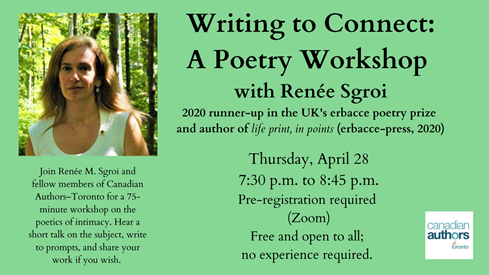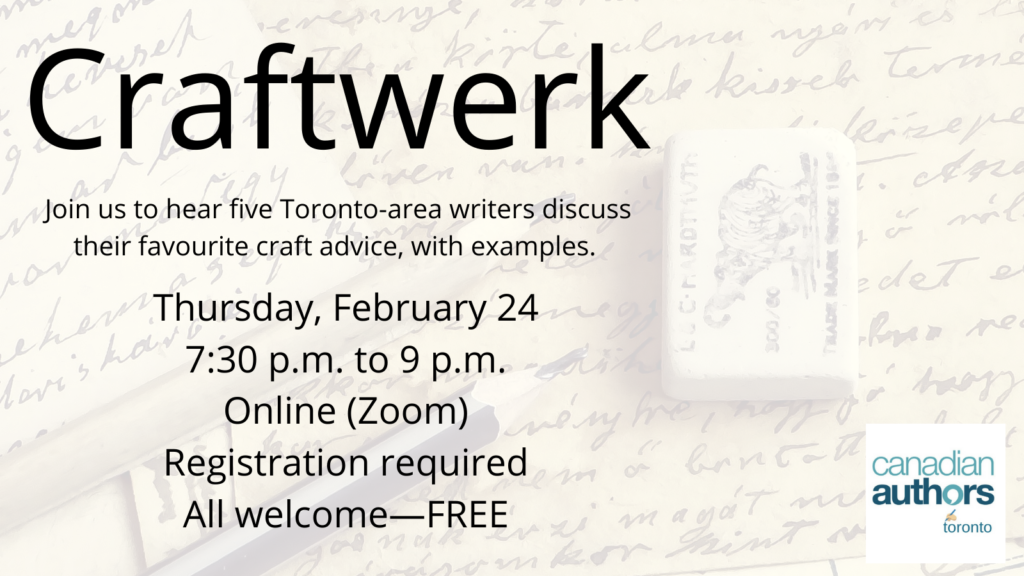#CAAEvents

Open Mic Night!
Tuesday November 29, 7:30pm to 9pm ONLINE (Zoom)
All are welcome to this free event, but pre-registration is required.
About this Event:
Winter is coming and #CAAEvents programming is holding another one of its popular Open Mics!
This month, 14 Canadian Authors–Toronto members and one non-member will have the opportunity to read their fiction, non-fiction, or poetry on Zoom. Whether you choose to share a published piece or a work-in-progress, we’re excited to hear your words!
All are welcome to attend, and we hope you’ll invite friends and family to join the audience.
Reading spots are reserved for CAA–Toronto members, with one exception: as part of our continual outreach efforts, we’ll invite one non-member to read at each open mic.

We were so pleased to gather online on Wednesday October 26th for our first ever Winners’ Circle reading and Open Mic!
Our first place poetry and flash fiction winners, Sneha Subramanian Kanta and K.L. Shailer were able to read (see bios below), as well as second and third place winners in both category: Callista Markotich, Maggie Daly, Anne Walk, Shauna Cassell, and Suzanne Craig-Whytock.
We also had some great open mic readers, including our very own Pamela Yuen, Ed Seaward, Kevin Wilson, and EA (Doley) Henderson!
Thank you to everyone who came out for this spectacular event! Looking forward to next year’s Winners’ Circle!
For more on our first place winners, please see below.

Sneha Subramanian Kanta, (Toronto, first-place winner, poetry section, for “Un-Elegy, Or How Water Unmakes A Country”) has held fellowships and residencies with Anaphora Arts, the Vijay Nambisan Trust, The Seventh Wave and the University of Stirling. She is the author of the chapbook Ghost Tracks (Louisiana Literature Press,
2020), and her work has appeared in PRISM International, Room Magazine, HELD
Magazine, and elsewhere. She is the founding editor of Parentheses Journal. Website:
www.snehasubramaniankanta.com
Our guest judge and poet, Terese Mason Pierre, wrote that “Un-Elegy, Or How Water Unmakes a Country” “astounds … in language and form; from the beginning, it bends and unfurls like a river, into a place like home, like prayer.”

K.L. Shailer (Maple Ridge, B.C., first-place, flash fiction section, for “Twilight”) is a lifelong student of fairy tales and myths. After attending the Humber Summer School in Creative Writing and the Banff Writers’ Studio, she recently transitioned from teaching and publishing articles about German and Scandinavian Romanticism to writing original tales that share many of the same themes and tropes. She lives and writes both in southwest Ontario and Maple Ridge, B.C.
Guest judge and author, Sheung-King, Aaron Tang, wrote: “‘Twilight’ brilliantly explores the power of stories: how myths can be used to comprehend the complex world we live in, and reminds us that the collective reading and telling of stories allows for ideas and people to connect.”


| Writing to Connect: A Poetry Workshop with Renée Sgroi Thursday, April 28, 2022 7:30 p.m. to 8:45 p.m. Online (Zoom) Digital doors open at 7:15 Registration required: https://us06web.zoom.us/meeting/register/tZUpfuGgqzoqHdKOPJ_lrydjgXXPFc8EbS6_ After registering, you will receive a confirmation email containing information about joining the meeting. Please keep that personalized link handy; you will need it to get into the workshop. |

Canadian Authors Association–Toronto presents:
Craftwerk (#1)
Thursday, February 24, 7:30 p.m. – 9:00 p.m. EST
ONLINE via Zoom
Register in advance for this meeting:
https://us06web.zoom.us/meeting/register/tZItd–srj8rHdC3Tqgz53QIwG6iMLb9mSru
After registering, you will receive a confirmation email containing information about joining the meeting.
To request one of two spots in our mini open mic at the end of this session, email Lee at leeparpart@gmail.com.

ABOUT THE PROGRAM:
Have you ever had a great piece of writing advice come to you at just the right time, in such a way that you were finally able to absorb it and put it into practice? What did you learn, and how do you incorporate that advice into your own writing?
We’ve all heard the saying, “Show, don’t tell.” As one of the best-known and oft-cited pieces of advice on writing, this phrase sits atop of a mountain of tips and suggestions designed to help you improve at the level of craft.
Welcome to Craftwerk, the first in a series of CAA–Toronto programs designed to demystify elements of craft and get branch members talking to each other about how writing tips can be put into practice.
A couple of times a year, we’ll invite a few branch members (and/or other guest speakers) to bring in a favourite craft tip for dissection and discussion. Think of this as a kind of Show and Tell for members (and occasional non-members) to share some of the knowledge they’ve picked up while working on their writing. After introducing a favourite craft tip, they’ll share an example or two from their own work or the work of others. Then we’ll open things up for questions and/or discussion.
For our first session, we’ll hear short presentations from five Toronto-area writers: Kevin Wilson, Jean Sheppard, Suzanne Craig-Whytock, Njoroge Mungai, and Laura McNeil.
We’ll follow this with a short Q&A session and — given time — a mini open mic featuring new work by two members.
Pre-registration is required. Please use the link at the top of this listing to register. After registering, you will receive a confirmation email containing information about joining the meeting, including your personalized Zoom link.
Do you have a favourite craft tip that you would like to share during a future session of Craftwerk? Email branch co-President Lee Parpart at leeparpart@gmail.com.
ABOUT OUR PANELLISTS:
| Award-winning writer Suzanne Craig-Whytock is the author of three novels (Smile, The Dome and The Seventh Devil, all from Bookland Press) and one short story collection, Feasting Upon the Bones, from Potters Grove Press). Her short fiction, poetry, and articles have appeared in numerous literary magazines, and she regularly publishes humorous essays focused on life’s absurdities on her own website under the pen name mydangblog.She has worked in education most of her life, and was a high school English teacher in Ontario for over 20 years. Suzanne will speak about “The Importance of Seeing and Hearing,” which will include a discussion of visualization and writing dialogue. |
| Njoroge Mungai writes fiction, screenplays, non-fiction, and works for the stage. His poem, “Emancipation,” was featured during an event called CLICKS held at the Royal Ontario Museum. He is also the founder of Upendo Books Ltd., a publishing house dedicated to uplifting artists that have been historically maligned. To address the lack of representation in various creative industries, Njoroge launched a podcast called Diversity & Inclusion. Google Podcasts named it the number one show for Diversity and Inclusion. Njoroge will discuss “intention and obstacle.” |
| Jean Sheppard is a writer, editor and educator living in Toronto. She currently runs online life writing courses for seniors, offering workshops on flash memoir, legacy letters, and everyday creativity. Jean will speak about craft advice in relation to magic realism: “One of the most powerful things literature can do is surprise us into new ways of seeing the world—and that’s the particular magic of magic realism. A man wakes one morning to find he’s turned into a giant insect. A priest suddenly levitates and disappears into the ether. The familiar is made very strange — and very compelling. So how do we as writers enter the world of magic realism? How can we use the concrete to catapult us into the fantastical? In the time allotted, I will expand on the above and share two flash fiction pieces.” |
| Kevin Wilson’s debut novel, An Idea About My Dead Uncle, won the inaugural Guernica Prize in 2018. His latest novel, Call Me Stan: A Tragedy in Three Millennia, was published in December 2021 by Guernica Editions. Kevin will speak about exposition in historical fiction: “Historical fiction sometimes requires stretches of exposition. To set the stage. To flesh out an unfamiliar context. To bridge a chronological gap in the narrative. The danger is that it can come off as dry, losing the reader’s attention rather than engaging it. Using a couple of brief examples, I will demonstrate some ways to keep your exposition fresh.” |
| Laura McNeil is a writer and editor based in Toronto, where she knows all the good coffee shops. After living and working as a magazine editor in New York City for more than 10 years, she and her husband moved back to their home province of Ontario to raise their boys. She has published in magazines such as Blue (The New Adventure Lifestyle), Strut, and Seed. She is at work on her first novel, Blue is Not a Colour, the pitch for which was shortlisted for the Pitch to Win contest from Retreat West. She will talk about how to write what you know, emotionally: “The old adage, ‘write what you know’ can seem very limiting to a writer whose characters are witnessing a genocide, surviving a horrible accident, or committing a cardinal sin. I’ll talk about how this can be reframed to ‘write what you know, emotionally’ — how the writer can bring their own emotional experiences/reactions to bear on the experiences of their characters.” |
